Over the past year, the demand for weight loss medications has increased dramatically and so-called "skinny jab" drugs (GLP-1 receptor agonists Wegovy, Ozempic, and Mounjaro) have consistently struggled to avoid drug shortages. This demand is only expected to increase in the future, with many industry experts predicting enormous levels of prescribing in the next 5-10 years.
Though Wegovy is the only therapy in this class indicated primarily for weight management, Ozempic and Mounjaro have been prescribed and used off-label for the same purpose. All three drugs are administered via injection and help individuals achieve weight loss by reducing feelings of hunger. Due to the public’s perennial interest in weight loss therapies, these "skinny jab" drugs are among the most talked-about medications in recent times.
The drugs have also caught the attention of a number of celebrities. For example, tech mogul Elon Musk tweeted about Wegovy several times in late 2022. Late-night talk show host Jimmy Kimmel even made a joke about Ozempic during his Oscars monologue in March 2023.
To better understand the volume and tone of public conversations surrounding "skinny jab" drugs, ZoomRx has executed an in-depth analysis of Twitter conversations over the last 12 months. This analysis has revealed some surprising findings that shed light on the growing interest in these weight loss medications and the potential implications for the pharmaceutical industry and the broader healthcare landscape.
Behind the Buzz: Analyzing the Twitter Conversation Around 'Skinny Jab' Drugs
One of the most striking findings from our analysis of tweets is the explosive growth in discussions about this drug class. Ozempic leads the way in Twitter mentions, accounting for a staggering 74% of all branded tweets in Q1 2023. However, the volume of tweets for all three “skinny jab” drugs have increased exponentially in 2023. The volume of tweets mentioning Ozempic grew by 15x between Dec ‘22 and Mar ‘23. Over the same time period, Wegovy's tweets grew by 6x and Mounjaro's tweets grew by 3.5x.
The growth in Ozempic engagement shows no signs of slowing. However, parallel increases in Wegovy and Mounjaro mentions suggest that while Ozempic may be the current leader in terms of brand awareness and engagement, there is still significant room for growth and competition in this space.
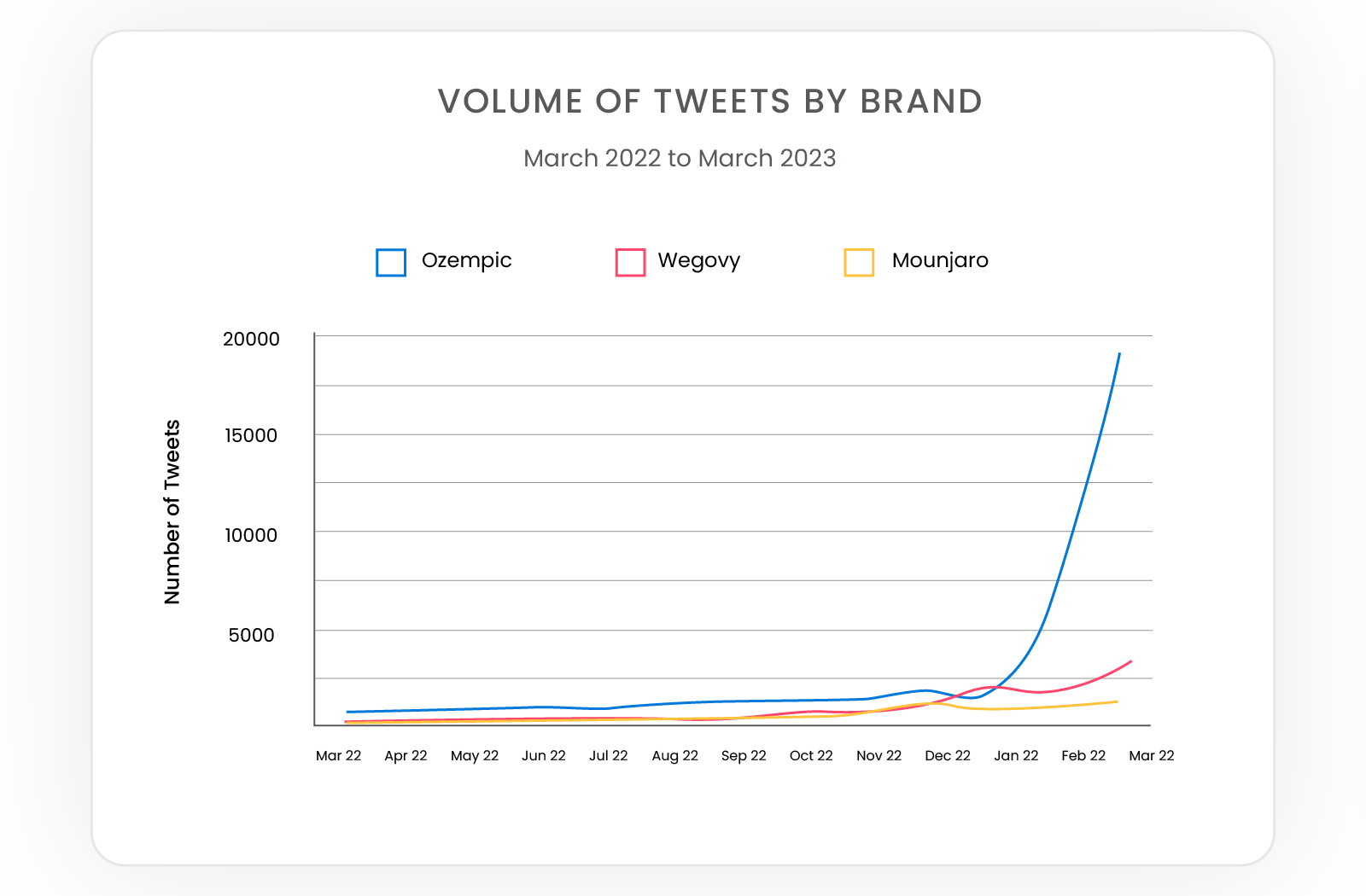
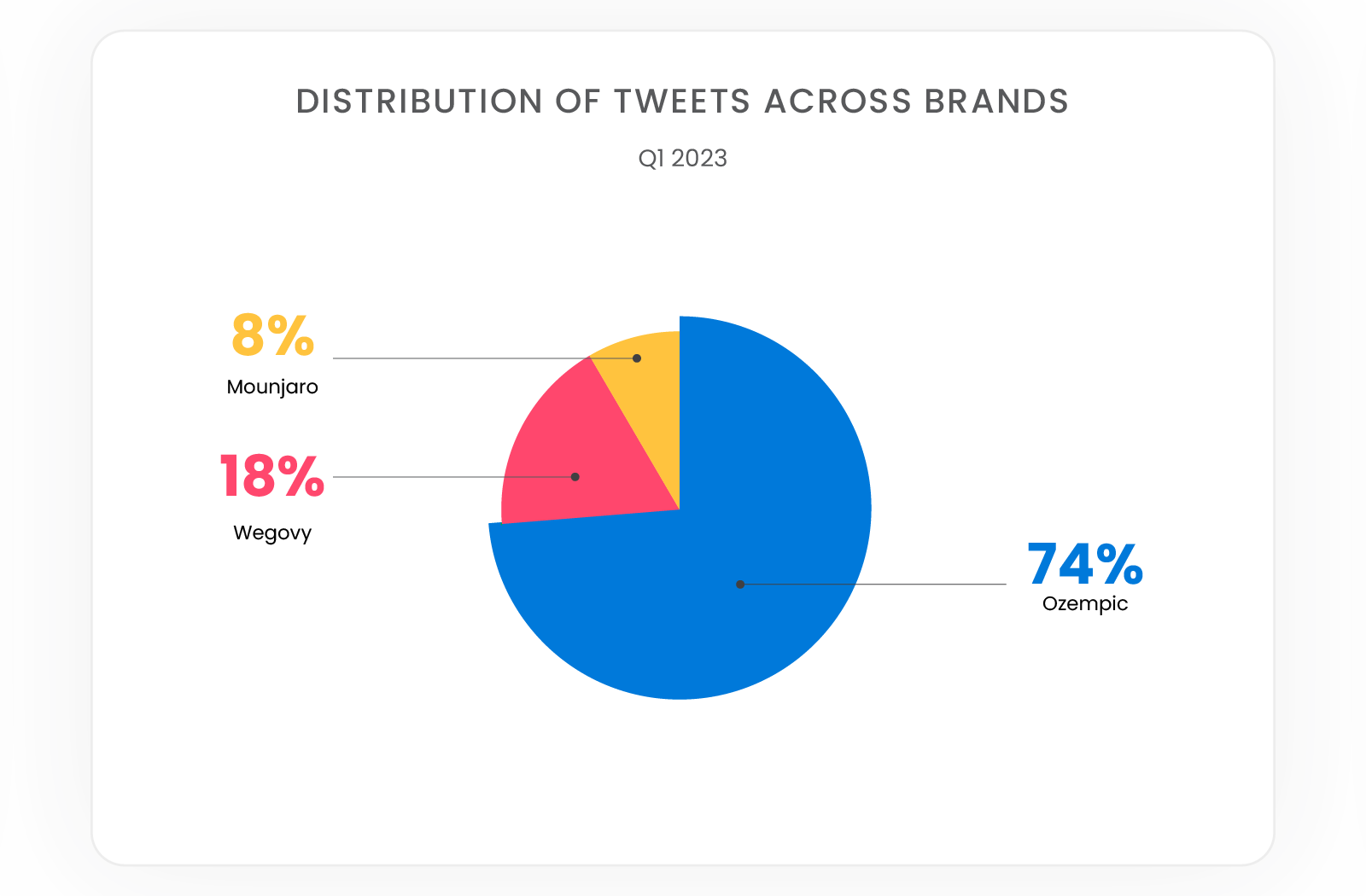
The good, the bad, and the ugly: Understanding the sentiment of tweets about weight loss drugs
When examining the content of tweets mentioning each brand, clear differences emerge. All brands have a base of 20-40% of tweets focused on core drug characteristics such as safety and efficacy. However, only Ozempic and Wegovy (both Novo Nordisk brands) have received significant Twitter traffic based on celebrity mentions or other viral events. In the absence of these viral moments, Lilly has leveraged patient anecdotes as a major part of their Twitter strategy for Mounjaro.
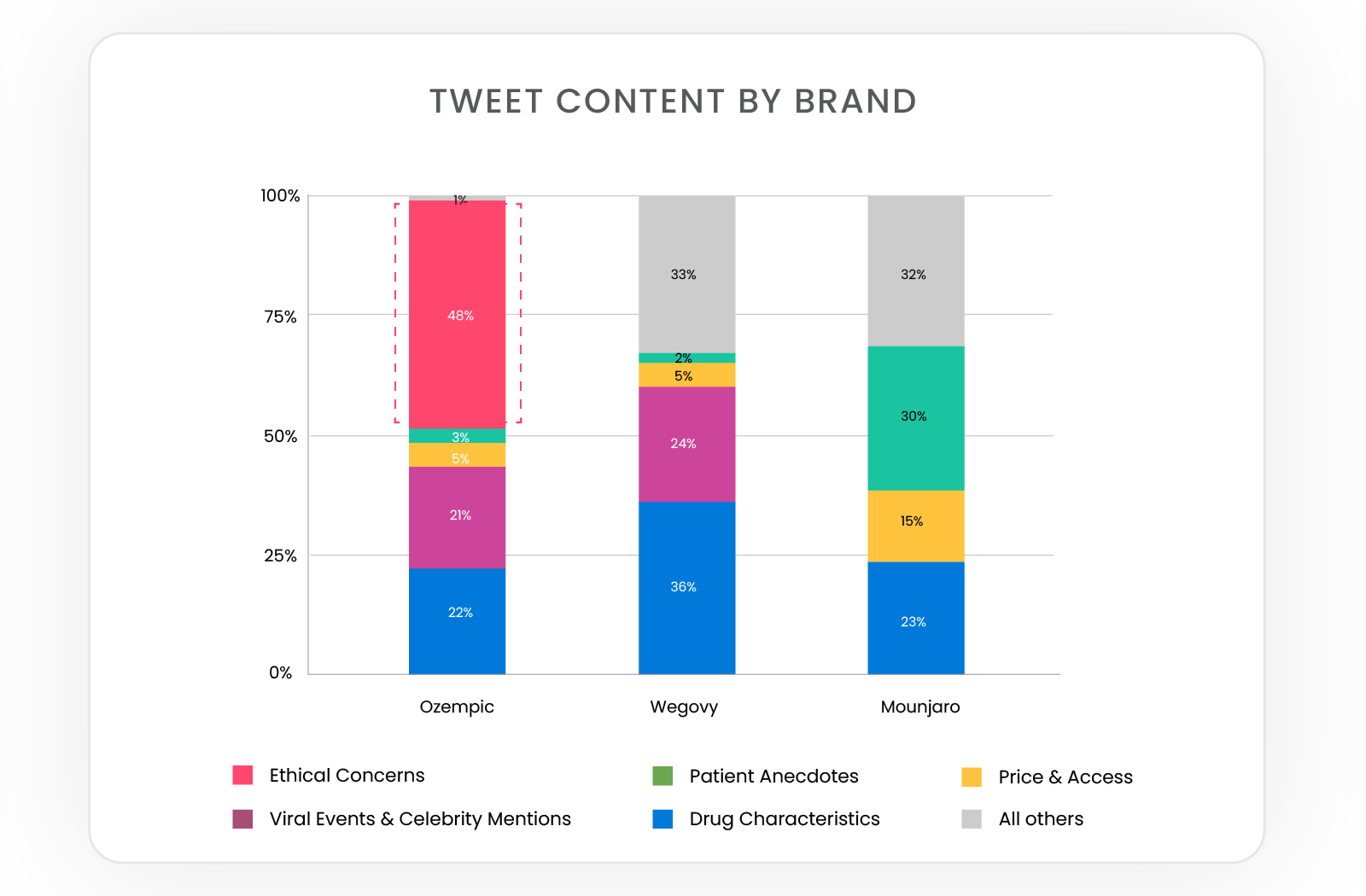
Perhaps most importantly, nearly half (48%) of all Ozempic Twitter mentions are negative in tone, focused on ethical concerns. These ethical concerns can be wide-ranging, encompassing patients that pursue the drug for weight loss, Doctors that prescribe the drug off-label, discussion of drug shortages, and broader commentary on society’s obsession with weight.
In fact, the number of tweets expressing ethical concerns around Ozempic is greater than the total number of tweets for Wegovy and Mounjaro, combined! The big question for Ozempic may be “Is all press good press?”
In the following sections, we dive deeper into the most common conversations happening on Twitter for each brand.
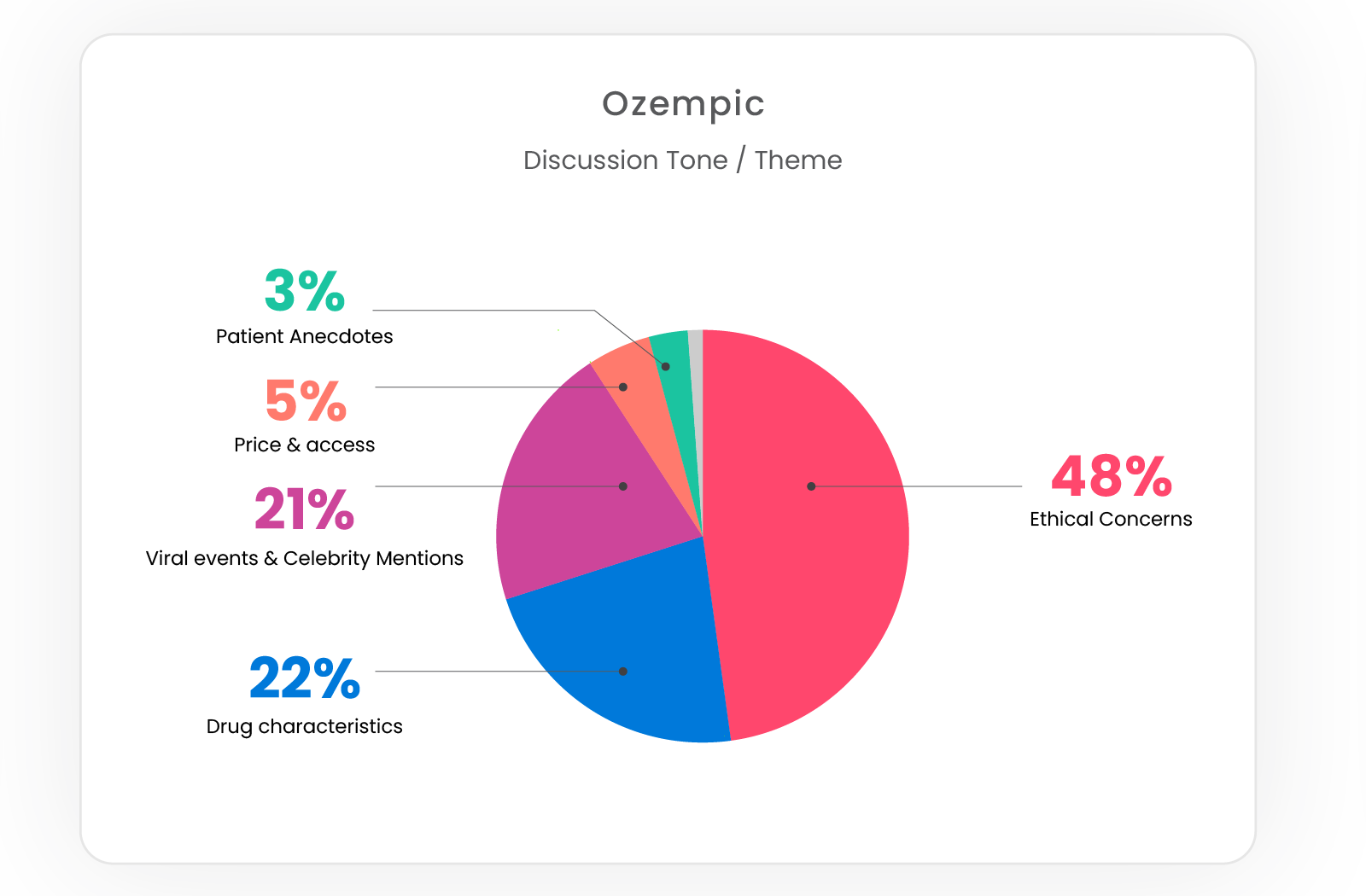
A plurality of tweets mentioning Ozempic expressing ethical concerns about use of the drug. Many of these focus on the drug's unavailability for patients with type 2 diabetes due to shortages caused by the high demand for use in weight loss, as well as advertising without health warnings. Another common criticism is the unethical practice of doctors prescribing the drug off-label.
Along with this, 21% of tweets are related to celebrity endorsements, including mentions from famous figures like Jimmy Kimmel and Mindy Kaling.
17% of tweets discuss product education, including potential downsides of the “miracle drug” like loss in lean mass.
Tweets using the term "skinny jab" are generally negative in tone and are highly associated with criticisms of Ozempic, while such terminology and concerns are much more rare for Wegovy and Mounjaro.
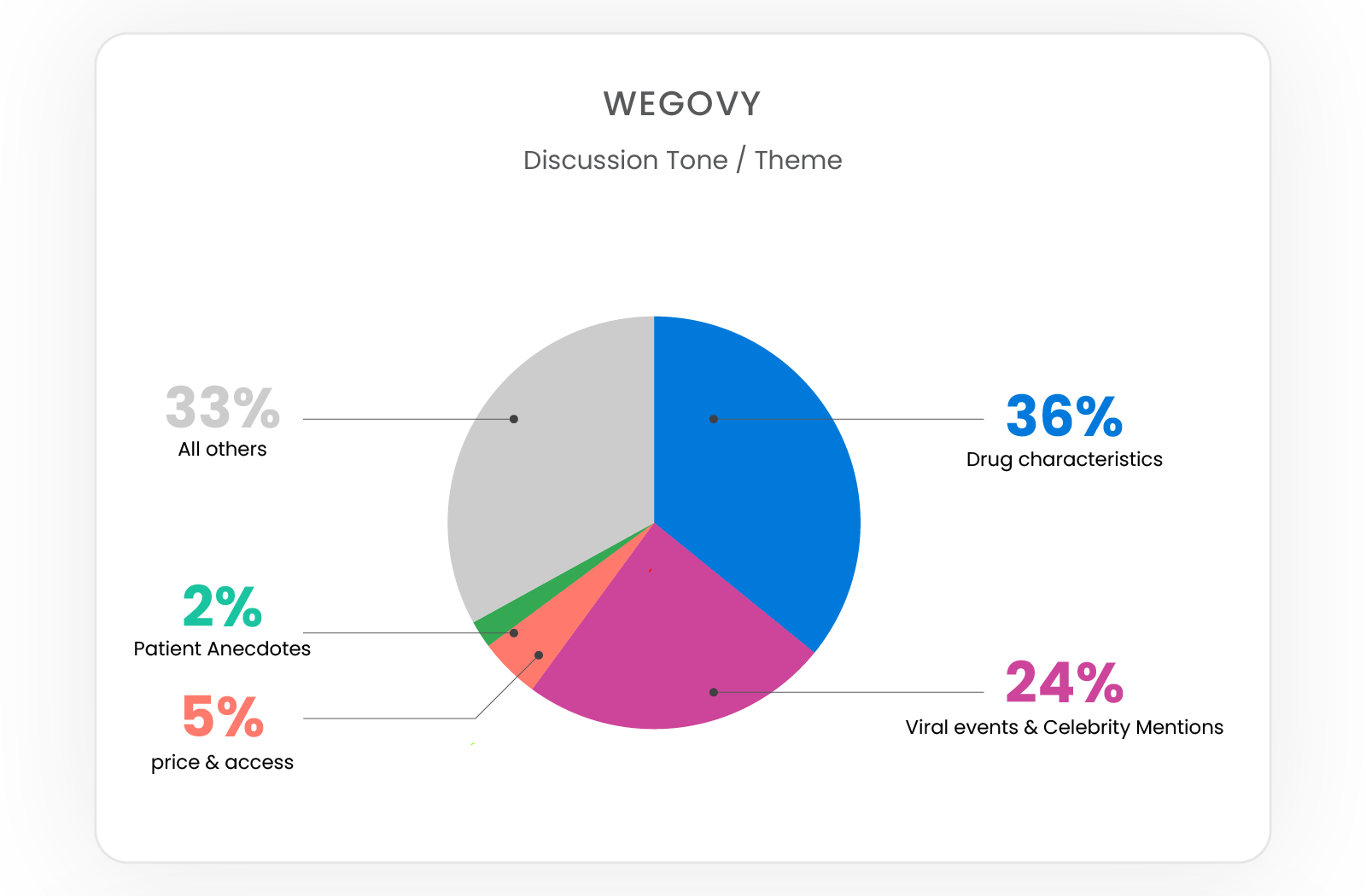
With Ozempic taking most of the heat in terms of Twitter criticisms, fellow Novo Nordisk brand Wegovy has been able to keep its Twitter mentions relatively positive and diverse.
A substantial portion of tweets (36%) discuss product education, addressing the ongoing debate on whether Wegovy should be prescribed for treating diabetes or weight loss. Some users have noted that Wegovy's popularity as a weight loss drug has created a shortage for people with diabetes.
Viral events such as celebrity and organizational endorsements account for 24% of Wegovy tweets. These tweets shed light on Hollywood personalities who are willing to spend $1,000 per month on their weight loss journey using Wegovy, as well as reactions to organizations like WeightWatchers embracing the drug.
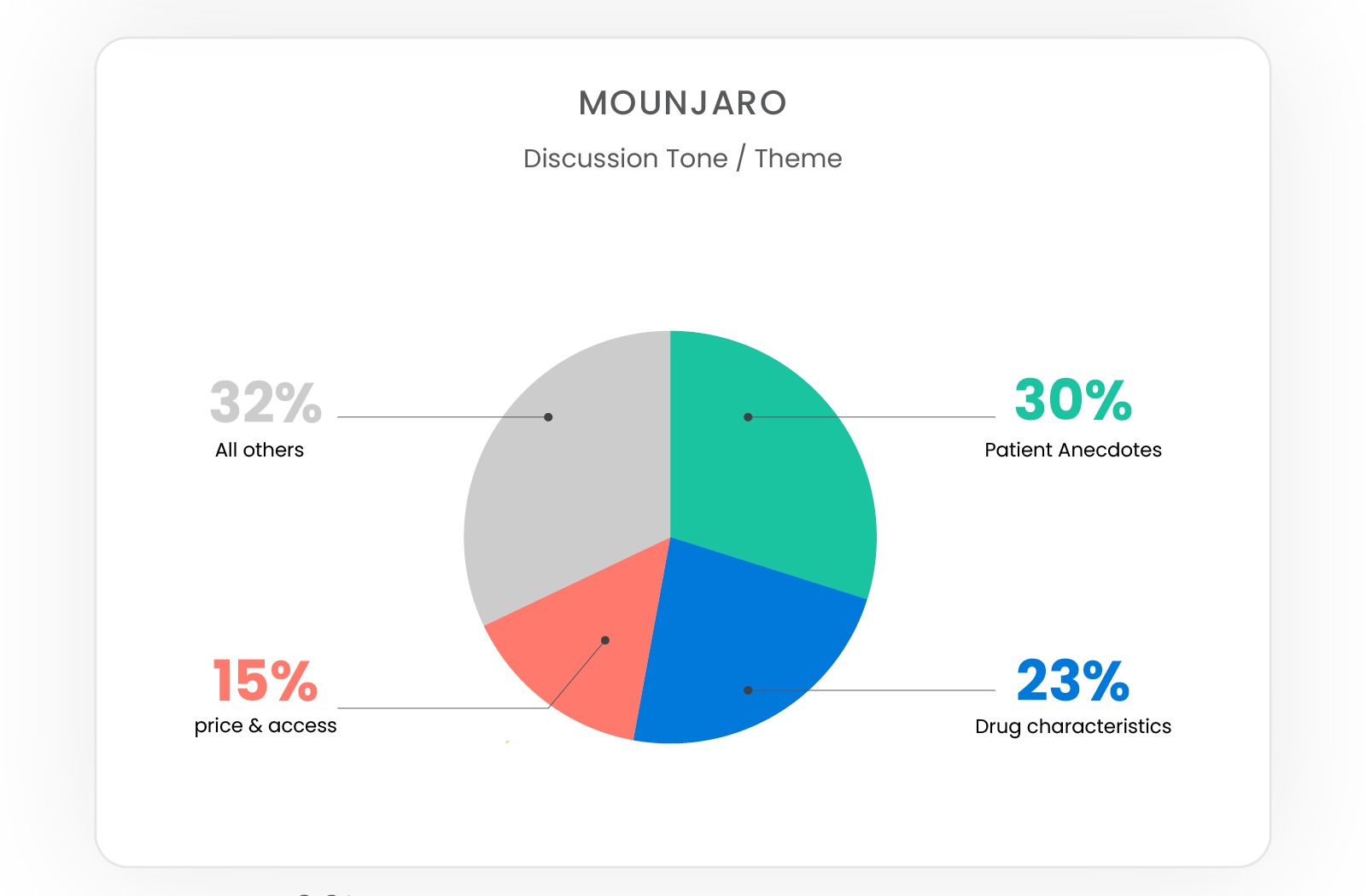
Mounjaro, produced by Eli Lilly, has drawn the least attention on Twitter, with relatively positive sentiment overall. Patients sharing their experiences account for 30% of all tweets, with many comparing Mounjaro with Wegovy, following Elon Musk's tweet about using Wegovy.
23% of Mounjaro tweets were about drug characteristics, with largely positive sentiment. Often, a tweet from an HCP describing clinical benefits leads to further patient discussion in reply. Discussions Mounjaro’s delivery method were also common, with some patients describing experiences of improper administration causing bruising and pain.
Another 15% of tweets mention price and access. The drug's high demand led to shortages in many pharmacies for several weeks, severely hindering patient access. Other tweets highlight that many insurance companies do not cover the cost of Mounjaro, and the affordability of the drug for most people is due to manufacturer discount codes.
Implications for Pharma and Patients Alike
The high demand for weight loss drugs such as Ozempic, Wegovy, and Mounjaro presents a significant opportunity for pharmaceutical companies, despite ongoing issues with drug supply and patient access. However, the growing popularity of these medications also raises concerns about responsible prescribing practices and potential side effects. As regulatory agencies respond and demand continues to grow, it will be interesting to see how public sentiment evolves. Only time will tell whether the negative attention for Ozempic begins to take its toll, or whether Mounjaro and Wegovy can generate social buzz on the scale that Ozempic has achieved.
There is a clear need for pharmaceutical companies to actively monitor social media conversations surrounding their products. With a high volume of tweets discussing the efficacy, safety, and access to popular drugs like Ozempic, Wegovy, and Mounjaro, companies must be proactive in addressing concerns and providing accurate information to patients and healthcare providers. At ZoomRx, we specialize in monitoring and analyzing life sciences conversations across digital channels to provide our clients with insights and actionable recommendations. To learn more about how we can help your team stay ahead of the conversation, please reach out to us at info@zoomrx.com


